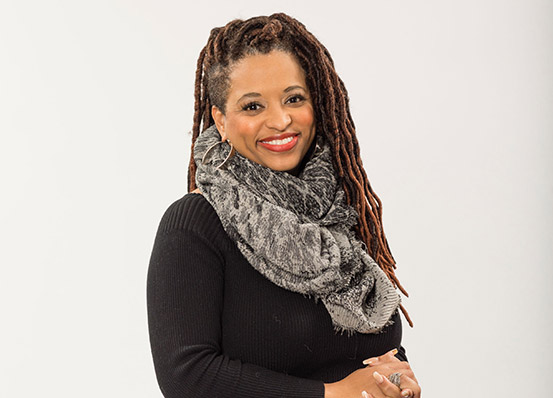Wendy Greene: Untangling Race, Hair, and Grooming Codes Discrimination
Scholarship by Professor Wendy Greene

Professor Wendy Greene, who grew up in South Carolina, was 5 years old when she learned that civil rights activism is in her blood. Missing school because she was sick, Greene read a book about African American pioneers, including civil rights advocates like late Supreme Court Justice Thurgood Marshall. This prompted a discussion with her mother about her parents’ own civil rights work, which included lunch-counter sit-ins and voter registration drives in the South.
With her parents as an example, Greene started her own civil rights journey in law school when she began to uncover a discrepancy in anti-discrimination law which, for decades, has allowed for lawful discrimination against Black people’s natural hairstyles in the workplace and in schools.
Working on this civil rights issue for more than a decade, Greene has become a leading voice in the global movement to combat race-based natural hair bias and discrimination. Her scholarship is focused on intersectional and multi-dimensional analysis of workplace discrimination and the social construction of race. She has, among other things, successfully argued against the biological constructions of race that have shaped federal courts’ decisions in Title VII race discrimination cases, which permit employers to regulate Black people’s natural hairstyles (except for Afros), as well as Title VII jurisprudence that allows what she has coined “misperception discrimination”: discrimination arising from an employer’s erroneous perception of a plaintiff’s racial, religious, or ethnic identity.
As she has educated diverse constituencies around the world on grooming codes discrimination and in particular, race-based natural hair discrimination that African descendants experience, Greene has uncovered a surprising lack of awareness around its prevalence, harms and legality. “Many people are under the impression that our civil rights protections already clearly protect against this form of racial discrimination, or, on the other side of it, there are people who aren’t even aware that race-based natural hair discrimination is such a pervasive issue for African descendants,” said Greene.
Greene’s scholarship has fueled her substantial legal advocacy. Greene is one of the legal architects of the federal “Creating a Respectful and Open World for Natural Hair” Act (CROWN Act), and she has advocated for its passage on state and municipal levels as an expert witness and advisor. The CROWN Act and parallel legislation have now been enacted in 17 cities and eight states. She continues to advocate for the enactment of the federal bill, which the House of Representatives passed in the 2019-2020 Congressional session and was reintroduced in the U.S. Congress on March 25, 2021.
On the litigation side, Greene co-drafted an amicus brief and has served as a legal consultant and an expert witness in race discrimination cases challenging natural hair bans in schools and workplaces. Most recently, she served as an expert witness in a high profile civil rights case brought by the NAACP-Legal Defense Fund on behalf of two African descended male students who were instructed to cut off their dreadlocks in order to matriculate in their Texas high school (Arnold v. Barbers Hill Independent School District). In a groundbreaking ruling that recognized the students’ constitutional claims, the federal district court remarked that Greene provided “persuasive historical and sociological evidence” showing African descendants’ natural hairstyles like dreadlocks, braids, and Afros can be an expression of their racial and cultural identity, which the school’s grooming policy infringed upon.
“Throughout my work, I’m trying to provide very practical legal interventions that are steeped in legal theory, interdisciplinary perspectives and most importantly, the real, lived experiences and consequences of racial discrimination,” said Greene. “With this, I hope to stop the centuries-long practice of race-based natural hair discrimination alongside other forms of racial discrimination, which until recently have been legal.”